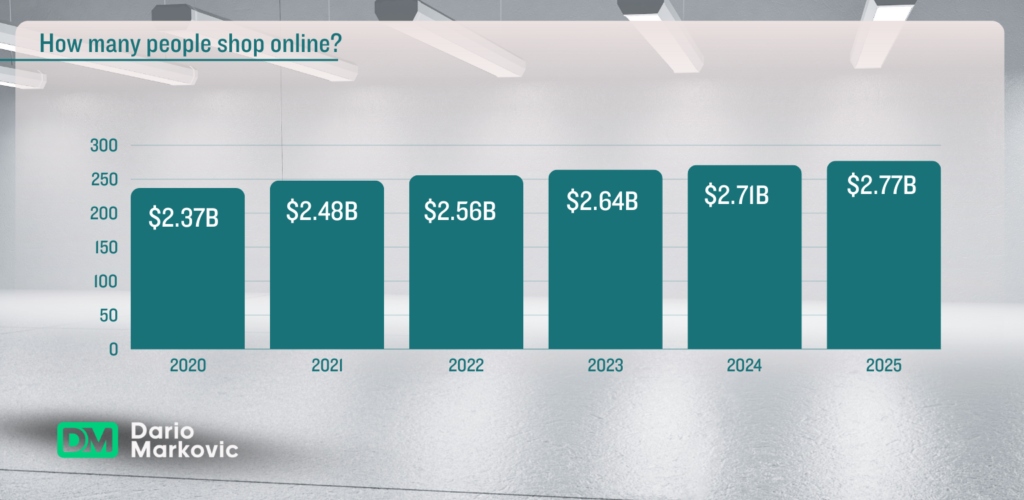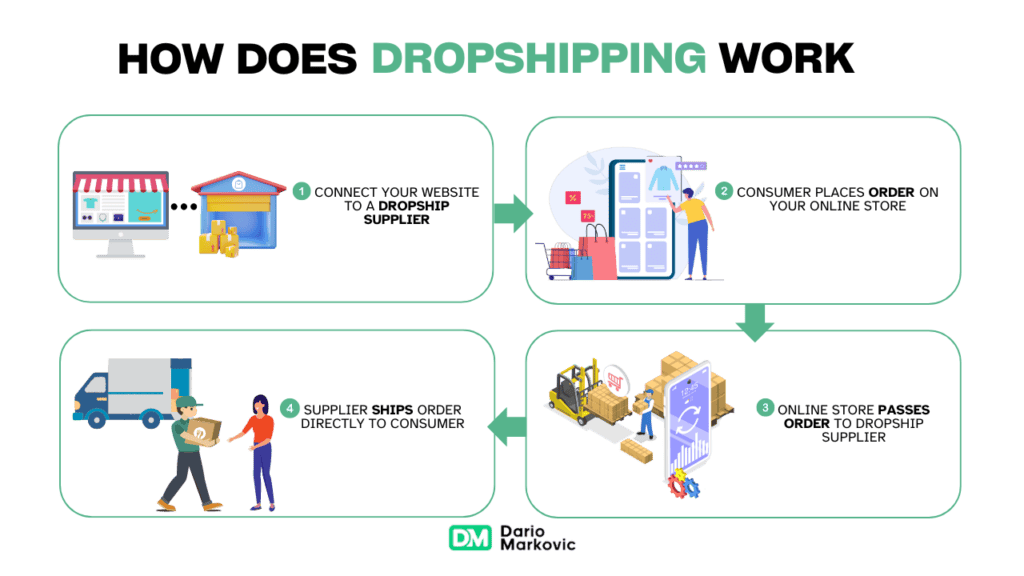If you’re on the hunt for ecommerce business ideas that are both actionable and lucrative to initiate in 2024, you’ve landed at the right spot. In this blog, we delve into a collection of 20 profitable ecommerce business ideas designed to ensure your success within the current marketplace.
PERSONAL PICK

Subscription Boxes
Provide a steady and predictable revenue stream through recurring monthly payments from subscribers.
Digital Products
They have low overhead costs, as there are no manufacturing, shipping, or storage expenses.
Why Start an Ecommerce Business in 2024?
The ecommerce sector is experiencing a surge, with predictions suggesting that the revenue in the U.S. might exceed \$1,300 billion by 2025. The market’s growth stems from how effortlessly new entrants can launch their ventures.
Starting an ecommerce business is easier and cheaper than conventional retail operations. There’s the appealing prospect of reaching an almost endless audience worldwide—all from any location as long as you have a laptop and stable internet connection. Idealy.
Ecommerce offers immense scalability—one key advantage over brick-and-mortar stores. Online stores are not limited by physical space or local presence.
Hence, they can offer a broader selection of products and cater to customers day and night via your online storefronts. With little need for actual store premises comes substantial cost reductions—another reason making it more viable for burgeoning entrepreneurs.
Embarking on an ecommerce venture also gives access to comprehensive data analytics tools provided by ecommerce platforms, which deliver deep insights into customer behaviors and preferences, including:
- Customizing offerings along with marketing strategies
- Basing decisions on solid data
- Acknowledging trends
- Impacting website design plus user experience positively
- Assessing digital campaign results effectively
These capabilities make for very effective and inexpensive targeting through digital channels against more conventional promotional approaches.
Countless successful ecommerce businesses have grown from humble beginnings, proving that large sums of money are not necessarily required in this field. Instead, meaningful planning accompanied by willfulness leads one along the path of being able to carve out profitable niches in the dynamic world of ecommerce entrepreneurship.
What Are the Best Ecommerce Business Ideas for 2024?
Now that we know the benefits of starting an ecommerce business in 2024, let’s consider concrete options—concrete ecommerce business ideas that will work in the current market landscape. Here is a list of 20 profitable ecommerce business ideas, including information on the potential of markets, profitability margins, and the initial costs to get up and running.
Whether dropshipping, print-on-demand services, entering into smart home devices, wearable fitness tech, or environment-friendly gadgets, the following suggestions shall satisfy many diversified interests in creating an online store.

1. Dropshipping Store
Starting an ecommerce business through dropshipping is a top-notch idea for entrepreneurs seeking to dive into the market with a modest initial outlay.

Pros & Cons
- Low startup cost: No need to hold inventory.
- Easy to scale: You can quickly add new products without worrying about inventory management.
- Wide product selection: Access to a vast range of products to sell.
- Low margins: Profit margins can be thin due to competition.
- Inventory issues: Reliance on suppliers can lead to stockouts or shipping delays.
- Less control: Limited control over product quality and shipping processes.
Any person interested in this ecommerce business idea should know that the very basis for success within this niche lies within reliable suppliers.
Many drop shippers are inclined to look at trending products from trusted sources like DSers, Spocket, and DropCommerce. These services work very well with Shopify shops, so you can pay attention to marketing and scale up your business while avoiding the headache of inventory management.
Opinion Piece
Dropshipping can be a great way to start an e-commerce business with minimal upfront investment, but the lack of control over inventory and shipping can lead to customer service challenges. It’s essential to choose reliable suppliers and find a niche where you can differentiate yourself from competitors.
2. Print-on-Demand Merchandise
It’s an e-commerce business idea with very high potential and very low risk with a POD model, as you don’t need to hold any inventory or make heavy investments in machinery upfront.
The global print-on-demand services market, valued at approximately $6.18 billion in 2022, is expected to increase at 25.8% by 2023 to 2030. Therefore, it is a super venture for visual artists and graphic designers with digital marketing insight.
Pros & Cons
- No inventory needed: Products are created as orders come in.
- Customization: Offers the ability to create unique designs.
- Low risk: Minimal financial risk since products are only made when ordered.
- Low margins: Profit margins can be thin due to competition.
- Lower profit margins: Higher per-unit cost compared to bulk purchasing.
- Quality control: Variability in print quality and product durability.
Merchants can sell personalized products such as T-shirts, cups, and phone cases through their print-on-demand services on platforms like Printful—making creative expression into profitable merchandise that can hit a very big online audience. On average, this kind of entrepreneur in this sort of ecommerce business can net an average annual revenue of about \$1.6 million with profit margins close to 4.3%.
Opinion Piece
Print-on-demand is excellent for creative entrepreneurs. Since it involves just making the design, it avoids any risk of holding inventory. Delivery time and quality will have to be managed in terms of customer expectations.
3. Subscription Boxes
Over the last three years, an impressive 800% growth has been documented in the subscription box space of the ecommerce industry. They routinely show profit margins in the 40-60% range, an active source through transactions on recurrence.
The initial investment to start a business like this one has a wide range, from as low as $100 to aspiringly beyond $10,000, depending on the size and complexity of curating the contents inside each box. These types of businesses can expect a return on investment after periods ranging from one to three months.

Pros & Cons
- Recurring revenue: Predictable monthly income.
- Customer loyalty: Subscribers are likely to stay if they enjoy the service.
- Unique offerings: Opportunity to create curated, themed boxes.
- High churn rate: Keeping subscribers engaged can be challenging.
- Inventory management: Requires careful planning to ensure consistent supply.
- Upfront costs: Initial investment in product sourcing and packaging.
This business capitalizes on the ability to cater to very specific tastes and interests of consumers by concentrating on niche markets, like dessert or eco-friendly product subscriptions. A winning business model in e-commerce with subscription boxes focuses on niche markets because the company can cater to consumer tastes.
You will want to choose products people buy regularly when you frame your ecommerce business concept to be devoted to subscription service options. Appreciation techniques and strategies to maintain consumer loyalty will inevitably move a venture of niche-oriented subscription boxes toward enduring profitability.
Opinion Piece
While subscription boxes can indeed establish a loyal customer base and drive steady revenue, doing so will require maintenance of quality and engaging offerings, along with logistic considerations.
4. Handmade Products
It forewarns a billion-dollar industry of handmade products, projected to grow to $387.07 billion by 2024, in which ingenious business minds can tap into a lucrative frontier. This will comprise cute pet-shaped necklaces, chic earrings, and individually tailored art on canvas that will blow the minds of consumers demanding uniquely customized items.
Pros & Cons
- Unique products: Stand out with one-of-a-kind items.
- Personal touch: Appeals to customers looking for artisanal goods.
- Control: Full control over production and quality.
- Time-intensive: Crafting products by hand is laborious.
- Scaling challenges: Difficult to scale production without losing quality.
- Higher costs: Limited ability to reduce costs through bulk purchasing.
It can also be the perfect launch pad for handmade vendors. Joint entrepreneurs who use Shopify and Etsy inherit a ready audience without giving away high-profit margins. On the other hand, focusing on particular niche products, such as custom diamond engagement rings or metal art with a personal touch, might set your business apart from others.
Opinion Piece
Handmade products attract customers seeking unique, high-quality items, but scaling the business while maintaining craftsmanship is a significant challenge. It’s ideal for artisans who are passionate about their craft and willing to invest time in production.
5. Private Label Beauty Products
Private-label beauty products hit $54 billion by 2027 due to increased demand for natural cosmetics. This can be achieved by cooperating with manufacturers to rebrand or produce customized beauty products to suit small niche markets. Building a unique, recognizable brand is critical to succeed in this competitive beauty market.

Pros & Cons
- Brand control: Full control over branding and marketing.
- Higher margins: Potential for higher profit margins compared to reselling.
- Market demand: Beauty products have a consistent and growing market.
- High competition: The beauty industry is highly competitive.
- Regulatory requirements: Must comply with health and safety regulations.
- Significant investment: Requires substantial investment in product development and marketing.
Among such effective marketing strategies are the power of social media influencers, content marketing, and giving out samples. Again, promoting high-quality ingredients and eco-friendliness ensures that health-conscious customers will come in droves and become repeat customers.
Opinion Piece
Private label beauty products offer a lucrative opportunity to create a distinctive brand, but the market is competitive. Success requires substantial investment in product development and compliance with regulations.
6. Online Courses
The digital education sector is booming, and it is estimated that the global market’s value will reach as high as $848 billion by 2030. There is, hence, immense earning potential associated with developing online courses in educational, vocational, or specialized fields. This scalable business model can generate continuous passive income streams.

Pros & Cons
- Scalable: Create once, sell repeatedly.
- Low overhead: Minimal costs once the course is created.
- High demand: High demand
- Content creation: Time-consuming to develop high-quality content.
- Marketing: Requires effective marketing to attract students.
- Competition: Increasing number of online courses available.
To successfully promote online courses, one must:
- Develop and maintain inbound leads using social networking sites such as Instagram, Facebook, and TikTok
- Produce worthwhile content
- Interact with your target audience
- Establish a robust presence on the web
- Draw learners to enroll in your course offerings
Opinion Piece
Online courses are a fantastic way to monetize expertise and create passive income. However, the initial effort to create valuable, engaging content and market the course effectively can be significant.
7. Smart Home Devices
The forecast is that this smart home device market will soar to $99.41 billion by 2025. This includes products such as intelligent speakers, video doorbells, and automated thermostats—each with the benefits of ease of use and security features that the customer desperately wants.

Pros & Cons
- Growing market: Increasing adoption of smart home technology.
- High demand: Consumers seek convenience and automation.
- Innovation opportunities: Constant advancements in technology.
- Technical complexity: Requires technical knowledge and support.
- High initial costs: Significant investment in product development.
- Competition: Market is becoming crowded with many players.
Smart home is an industry with strong financial potential, with a quick average yearly revenue of $2.3 million and 5.5 percent profit margins. Selling high-quality products compatible with Alexa or Google Home allows targeting high-tech consumers.
Opinion Piece
The smart home devices market is booming, driven by consumer demand for convenience and automation. However, entering this market requires substantial technical expertise and investment in product development.
8. Health and Wellness Products
Ecommerce businesses focused on merchandise for health and wellness will ride the big waves of growth in the wellness sector. It has ballooned into a $4.4 trillion global market, growing annually by 5-10%. Some of the most in-demand products include plant-derived foodstuffs, natural skin care lines, and aromatic essential oils.

Pros & Cons
- High demand:Increasing focus on health and wellness.
- Diverse product range: Opportunities in various sub-niches.
- Recurring sales: Consumable products lead to repeat purchases.
- Regulatory compliance: Must adhere to health and safety standards.
- Competition: Highly competitive market with established brands.
- Product efficacy: Ensuring products deliver on their promises.
Ecommerce business ideas like selling CBD are highly profitable, with net profit margins reaching more than 40%. That is only for the CBD market, which is projected to increase to $20 billion by 2024. The huge average annual income, over $130K, for businesses in this niche is a major reason it’s appealing for pros such as nutritionists, fitness trainers, health experts, and athletes looking toward business ventures in wellness.
Opinion Piece
Health and wellness products tap into a growing consumer trend, offering opportunities for repeat sales. However, ensuring product efficacy and navigating regulatory compliance are critical for success.
9. Pet Products and Accessories
This industry is on fire, projected to hit as much as $350 billion by 2027. The pet care market value increased dramatically in 2021 to approximately $103.6 billion. Much of this increase can be attributed to pet owners now more than ever being prepared to spend big on their animal companions. Lucrative items in this area include:
- Pet treats made with organic ingredients
- Handcrafted playthings
- Tailor-made outfits for pets
- Various pet accessories

Pros & Cons
- Passionate customer base: Pet owners are willing to spend on their pets.
- Variety: Wide range of products and accessories.
- Recurring sales: Consumables lead to repeat business.
- Trend sensitivity: Popular products can change rapidly.
- Competition: A crowded market with numerous players.
- Quality control: Ensuring product safety and quality is crucial.
For those aiming to succeed in this particular segment, it’s important to craft products that cater directly to pets or the needs of their owners. Examples include:
Chew toys built for longevity
Beds designed with support as a priority
Supplements formulated for joint health
Personally customized clothing items for animals
Opinion Piece
The pet products market benefits from a dedicated customer base and opportunities for repeat sales. Success depends on staying ahead of trends and maintaining high product quality.
10. Digital Products
The demand for digital products is ever-increasing because of their easy reach and close-to-zero production cost. This list of digital products goes on and on, from an eBook and templates to software and online courses.
Selling digital products offers several advantages: reduced ongoing expenses, great prospects for scaling, and opportunities to attract customers worldwide.
Pros & Cons
- High margins: Low production and distribution costs.
- Scalability: Create once, sell indefinitely.
- No inventory: No need to manage physical stock.
- Content Creation: Requires significant effort to create valuable content.
- Competition: High competition in the digital products market.
- Piracy: Risk of digital products being copied or pirated.
This ecommerce business idea can be exploited by those with special skills or fields of knowledge, such as personal trainers or professional nutritionists. One way is to create online courses or eBooks on chosen subjects and sell them. It can also extend to unique sessions for personal coaching. This gives experts an opportunity further to monetize their expertise within the ecommerce business model.
Opinion Piece
Digital products are a great opportunity for high-margin, scalable business models. The challenge is how to create useful content and protect it from piracy, but the upside of zero inventory and low distribution costs is huge.
Steps to Launch Your Ecommerce Store
To embark on creating your ecommerce store, the initial steps include:
- Deciding which products to offer.
- Evaluating market demand for your proposed product idea to ensure there is potential for sales.
- Following this validation, move forward with sourcing or manufacturing these items.
- Develop a strategic business plan accordingly.
- Choose an appropriate platform that specializes in ecommerce to construct your online shop.
Implementing SEO and link-building techniques from the outset can greatly increase organic traffic flow to your site. Engaging in marketing campaigns through social networks such as Instagram and Pinterest can be pivotal in securing early customers. Devising a clear shipping framework and establishing tangible sales objectives are crucial pre-launch tasks for setting up your ecommerce operation.
Understanding fundamental SEO principles is key. They underpin building a website architecture conducive to search engine discoverability. A catchy brand name coupled with a relevant domain will aid you considerably in crafting an identifiable presence within the marketplace. Opting for an optimal blend of various selling channels will influence outreach capabilities and overall revenue generation efforts regarding eCommerce activity.
How Can Ecommerce Business Benefit You?
The anticipated growth of the ecommerce industry suggests that it will reach a staggering \$7.9 trillion by the year 2027, demonstrating its significant potential for revenue generation.
By 2024, forecasts indicate that the value of the global ecommerce market will reach an impressive milestone of \$6.3 trillion, signaling a consistent expansion in this domain. The evolving tendencies of consumers towards online shopping offer lucrative prospects for budding enterprises to capture considerable profits when adeptly orchestrated.
Launching an ecommerce enterprise comes with several advantages, such as expandability, cost efficiency, and access to worldwide customers. Yet, one must not disregard challenges like high rates of cart abandonment and necessitating effective promotional techniques. To ensure progressive advancement in your business venture’s lifecycle, longevity is achieved through fruitful engagements such as email marketing strategies and social media advertising investments, which are essential.
Embracing these hurdles head-on while commencing an online business can be significantly beneficial nonetheless. With calculated approaches coupled with resilience, new entrepreneurs can forge prosperous ventures in the digital commerce space, which presents profound possibilities regarding escalation and income acquisition.
What Is Ecommerce Business?
The primary forms of ecommerce encompass business-to-business (B2B) and business-to-consumer (B2C). B2B e-commerce pertains to transactions where products are sold between companies, such as bulk supply dealings.
In contrast, B2C commerce refers to selling items directly to end-users, such as those at apparel stores or gadget outlets. This form of commerce empowers businesses by liberating them from the confines of catering only to local clientele.
Wrapping Up: Dario’s Conclusion
Starting an ecommerce business in 2024 is ripe with potential for aspiring entrepreneurs. Utilizing the knowledge and concepts presented in this manual can lead you to identify a market niche that corresponds with your passions and competencies. With resolve and appropriate tactics, it’s possible to establish a flourishing ecommerce enterprise that yields financial gains and personal satisfaction.
Drawing from my experience within ecommerce, I can affirm the substantial prospects for expansion and achievement inherent to this vibrant sector.
In 2024, the ecommerce business sector is brimming with opportunities for aspiring entrepreneurs. With a range of niches at your disposal, including smart home devices and eco-conscious goods, as well as dropshipping and print-on-demand models, there’s an abundance of avenues to venture into.
By initiating your ecommerce store and implementing successful marketing tactics, you have the potential to cultivate a lucrative online business. Seize the moment now to transform your ecommerce aspirations into reality!
Frequently Asked Questions
Think about embarking on a dropshipping or print-on-demand venture as an excellent, low-risk business ideas within the ecommerce space for 2024. These types of businesses require very little initial investment and eliminate the necessity to handle physical inventory.
Start laying out plans for your future enterprise now!
To ascertain the market viability of your product concept, it is critical to engage in comprehensive market research and scrutinize your competitors closely. Employing resources such as Google Trends can be beneficial in determining consumer interest levels. Implementing limited-scale trial campaigns to monitor how well your product fares might also be wise.
Managing an ecommerce business involves tackling various obstacles, including reducing high shopping cart abandonment rates, implementing efficient digital marketing techniques, and overseeing logistics and customer service. It is crucial to devise strategies that effectively confront these challenges.
Enhancing your ecommerce shop’s search engine optimization is essential for attracting organic traffic and increasing sales. To achieve this, prioritize conducting keyword research and ensure that product pages are optimized using pertinent keywords. Generate superior quality content and establish backlinks to bolster your store’s ranking on search engines, a vital move for growing visibility and revenue.
I suggest looking into Shopify, WooCommerce, or BigCommerce for your online store needs. Each platform provides a diverse array of functions and integrations that can assist you in constructing and maintaining an efficient e-commerce presence.



